Me invita JSarto a través de la correspondencia privada a que escriba sobre el distributismo. No me siento capaz de hacerlo de mi puño y letra ahora, pero sí que quisiera presentar aquí una síntesis de esta corriente del pensamiento económico (y político). Para ello traigo a colación una selección de textos extraída de Peter Chojnowski, cuyo texto completo se puede leer aquí.
Peter Chojnowski es profesor de Filosofía en Estados Unidos, tomista, tradicionalista y católico. Su formidable conocimiento de la Summa Theologica y su habilidad para poner los conceptos tomistas al alcance del hombre de la calle y de juzgar con criterios de filosofía católica y escolástica los problemas modernos a que nos enfrentamos hacen de él un autor que a partir de ahora vamos a ir trayendo de vez en cuando a A Casa de Sarto.
No va a ser el primero ni el último sobre distributismo. En este momento estamos en contacto con una jovencísima y más que brillante estudiante de Clásicas de la Washington University en San Luis, EE.UU., quien escribió un conciso ensayo sobre este mismo particular para que nos lo deje publicar en A Casa de Sarto. Esperamos poder colgar este otro artículo próximamente.
Rafael Castela Santos
Distributism: Economics as if People Mattered
…
During the 19th and early 20th centuries, there were a group of scholars, theologians, philosopher, social critics, and poets, who predicted the inevitable demise of the capitalist economic system which was just developing in Continental Europe, but had been operative for 100 years in England […] one is struck by the fact that their analyzes are more valid today than they were 70 or 80 years ago, their predictions more likely to be imminently fulfilled …
In the case of Belloc, in his book The Servile State, it was predicted that capitalism would soon transform itself into an economic and social system which resembled the slave economies of the pre-Christian and early Christian eras. Why did they predict such a collapse or inevitable transformation? In their writings, many reasons are given, however, we can narrow them down to three. The first, they referred to as the "capitalist paradox." The paradox is a consequence of capitalism being an economic system which, in the long run, "prevents people from obtaining the wealth produced and prevents the owner of the wealth from finding a market." Since the capitalist strives both for ever greater levels of production and lower wages, eventually "the laborer who actually produces say, boots cannot afford to buy a sufficient amount of the boots which he himself has made." This leads to the "absurd position of men making more goods than they need, and yet having less of those goods available for themselves than they need."
…
The capitalist system, by its very nature, places the preponderance of wealth in the hands of a small minority. This monopoly on the money supply by banking and financial concerns, becomes more absolute as the capital-needing consumer must go to the banks to borrow money. Usury, now called "interest," insures that those who first possesses the money for loan, will end up with a greater portion of the money supply than they possessed before the loan was issued. As wages stagnate and interest payments become increasingly impossible to make, massive numbers of defaults will inevitably produce a crisis for the entire financial system. When entire nations default on loans, there will be a crisis throughout the entire international financial system. Demise is, therefore, built into the very structure of the capitalistic system in which capital (i.e., all kinds of wealth whatsoever which man uses with the object of producing further wealth, and without which the further wealth could not be produced. It is a reserve without which the process of production is impossible) is primarily in the hands of the few. As G.K. Chesterton rightly stated, the problem with capitalism is that it produces too few capitalists! The third fact concerning capitalism which the Distributists thought would inevitably bring down the system or lead to its fundamental transformation, was the general instability and personal insecurity which marks a full-blown capitalist economy. What accounts for this general feeling of insecurity and instability, which characterizes both the individual "wage-earner" and the society living under capitalism, is the always present fear of unemployment and, hence, of destitution and the fact that a laborer's real wages leave him with only enough money to cover the expenses of the day. Saving, so as to provide an economic hedge against the misfortune of unemployment or personal crisis, becomes almost impossible.
…
The social consequences of the majority being unable to afford real property, the decline and, eventual, disappearance of the trade guilds and vocational corporations, the "necessity" of wives and mothers entering the "work force," the end of small-scale family -owned businesses and farms, the decline of the apprentice system were all indictments of capitalism in the mind of those who sought to chart out a "third way" between capitalism, which is simply liberalism in the economic sphere, and socialism.
…
The institution of usury, always an necessary adjunct of economic liberalism, has caused in recent years more bankruptcies and personal debt than ever before in history. Nations, such as Indonesia, are tottering on the brink of social, economic, and political chaos because of their inability to pay the interest on their hundreds of billions of dollars in bank debt. If such a nation should go into default, it could threaten to throw a whole variety of nations into recession, depression, or worse.
It is not proper to say that the predictions of the imminent demise of capitalism were totally without fulfillment. The 1920s, 30s, and 40s witnessed reaction after reaction to the radical individualism which is the fundamental idea of liberal capitalism. Truly, the market is the institutionalization of individualism and non-responsibility. Neither buyer nor seller is responsible for anything but himself. The idea that if every man simply seeks after his own economic interest, all will be provided for and prosper, was almost universally rejected during these decades. We see strong reactions to economic liberalism in Russian Communism, German National Socialism, Italian Fascism, Austrian, Portuguese, and Spanish Corporatism, British Fabian Socialism, along with the American "New Deal" leftism. Thus, in the 1930s and 1940s, most of the world was ordered by ideologies which explicitly rejected the premises of economic liberalism. We must, also, not forget the international economic crash of the late 20s and early 30s, which produced economic depression, totalitarian regimes, and, finally, world war.
There is one fact which separates our day from the days of the 30s and 40s, however. The concentration of wealth and capital, the inadequacy of a man's pay to provide the basics of life and to provide for savings for the future, the lack of real property generously and broadly distributed, is masked by the reality of easy credit. Easy credit, which is not ultimately "easy" at all on the borrower, anesthetizes the populace to the grim facts of capitalist monopoly. Since we seem to be able to get all the things that we want, the reality of real money being increasingly unavailable to the average man is lost in the delusionary state of the consumerist utopia. Only when the "benefit" of usurious credit is cut off, do we realize the full extent of the problem. The greatest problem with liberal capitalism, however, is not the concentration of wealth or real property, the greatest "existential" problem created by capitalism is the problem of the very meaning and reality of work. To work is essential to what it means to be a human being. Next to the family, it is work and the relationships established by work that are the true foundations of society. In modern capitalism, however, it is productivity and profit which are the basic aims, not the providing of satisfying work. Moreover, since "labor saving" devices are the proudest accomplishments of industrial capitalism, labor itself is stamped with the mark of undesirability. But what is undesirable cannot confer dignity.
It is not merely that industrial capitalism has produced forms of work, both manual and white-collared, which are "utterly uninteresting and meaningless. Mechanical, artificial, divorced from nature, utilizing only the smallest part of man's potential capacities, [sentencing] the great majority of workers to spending their working lives in a way which contains no worthy challenge, no stimulus to self-perfection, no chance of development, no element of Beauty, Truth, Goodness." Rather, capitalism has so fundamentally alienated man from his own work, that he no longer considers it his own. It is those with the financial monopoly who determine what forms of work are to exist and which are "valuable" (i.e., useful for rendering profits to the owners of money). Since man spends most of his days working, his entire existence becomes hollowed out, serving a purpose which is not of his own choosing nor in accord with his final end.
In regard to the entire question of a "final end," if we are to consider capitalism from a truly philosophical perspective, we must ask of it the most philosophical of questions, why? What is the purpose for which all else is sacrificed, what is the purpose of continuous growth? Is it growth for growth's sake? With capitalism, there is no "saturation point," no condition in which the masters of the system say that the continuous growth of corporate profits and the development of technological devices has ceased to serve the ultimate, or even the proximate, ends of mankind. Perhaps, the most damning indictment of economic liberalism, indeed, of any form of liberalism, is its inability to answer the question "why."
Corporatism: The Catholic Response
…
The institutions which were being defended in Corporatist thought were the ancient "estates" or "guilds" which had been the pillars of Christian Germany for centuries. These corporate bodies, grouping together all the men of a particular occupation or social function, were an institutional opposition to the revolutionary doctrines of individualism and human equality. One early rightist thinker, Adam Muller, upheld the traditional idea of social stratification based upon an organic hierarchy of estates or guilds (Berufstandische). Such a system was necessary on account of the essential dissimilarity of men. Moreover, such a system would prevent the "atomization" of society so much desired by the revolutionaries who wished to remake in a new form that which had been pulverized by liberalism.
…
It was, however, a German nobleman and prelate, Wilhelm Emmanuel, Baron von Ketteler (1811-1877), Bishop of Mainz, who directed Corporatism into new avenues and forced it to address new concerns. […] As Pope Leo XIII himself admitted on several occasions, it was the thought of Bishop von Ketteler which helped shape his own encyclical letter on Catholic economic teaching Rerum Novarum (1891). The "new things" His Holiness was addressing were capitalism and socialism. Both meet with his condemnation, although capitalism is condemned with strong language as an abuse of property, a deprivation of the many by the few, while socialism is dismissed outright as being contrary to man's inherent right to own property.
Von Ketteler, also, in his book Die Arbeiterfrage und das Christenthum (Christianity and the Labor Problem), attacks the supremacy of capital and the reign of economic liberalism as the two main roots of the evils of modern society. Both represented the growing ascendancy of individualism and materialism, twin forces that were operating to "bring about the dissolution of all that unites men organically, spiritually, intellectually, morally, and socially." Economic liberalism was nothing but an application of materialism to society." The working class are to be reduced to atoms and then mechanically reassembled. This is the fundamental generative principle of modern political economy." What Ketteler sought to remedy was "This pulverization method, this chemical solution of humanity into individuals, into grains of dust equal in value, into particles which a puff of wind may scatter in all directions." Bishop von Ketteler's solution to this problem of the pulverization of the work force and the ensuing injustice which this would inevitably breed, was to propose an idea which was the central concept of medieval and post-medieval economic life, the guild system. When responding to a letter from a group of Catholic workers who had submitted the question "Can a Catholic Workingman be a member of the Socialist Worker's Party?," Bishop von Ketteler outlined the basic structure of these vocational guilds or Berufstandische: First, "The desired organizations must be of natural growth; that is, they must grow out of the nature of things, out of the character of the people and its faith, as did the guilds of the Middle Ages." Second, "They must have an economic purpose and must not be subservient to the intrigues and idle dreams of politicians nor to the fanaticism of the enemies of religion." Third, "They must have a moral basis, that is, a consciousness of corporative honor, corporative responsibility, etc. Fourth, "They must include all the individuals of the same vocational estates." Fifth, "Self-government and control must be combined in due proportion."
The guilds … would regulate all aspects of their particular trade, including wages, prices for products, quality control, along with certifying that all apprentices has the requisite skills to adequately perform the guild's particular art.
Following the intellectual path charted by von Ketteler, another German Catholic, Franz Hitze (1851-1921), wrote of the social, psychological, and, even, spiritual purposes which would be served by the vocational corporations or guilds. Claiming that "economic freedom" was only a myth serving to disguise the fact that capital actually ordered things completely with a single eye to its own advantage, Hitze saw no alternative to the economic and social control traditionally exercised by the guilds. It would be such organizations which overcame the antagonism between capital and labor which fed Marxist propaganda. In his book Kapital und Arbeit und die Reorganisation der Gesellschaft (Capital and Labor and the Reorganization of Society), Hitze states that such organizations would also end the fierce competition which is totally inconsistent with the idea of the Common Good and social solidarity. This idea that an economy can be ordered on the basis of "mutuality" and the identification of the interests of employer and employee, is difficult for those who assume that an economic system must be powered by competition and self-interest. It must be remembered, however, that such was the economic system of Christendom until the guilds were destroyed by the advent of the French Revolution.
What these traditional vocational groups were able to foster during the ages in which they ordered the life of the craftsman, was a decentralization both of property and of economic power. They, also, enabled the average craftsman to have a real say in the workings of his trade. Such economic "federalism" or decentralization prevented the development of financial monopolies. As Hilaire Belloc states, "Above all, most jealously did the guild safeguard the division of property, so that there should be formed within its ranks no proletariat upon the one side, and no monopolizing capitalist upon the other."
Chesterbelloc and Distributism
…
Hilaire Belloc and G.K. Chesterton … expressed not the socialist idea of the confiscation of all private property, but rather, the wide-spread distribution of land, real-property, the means of production, and of financial capital, amongst the greater part of the families of a nation. Such a concept, along with their encouragement of the guild system, of a return to the agrarian life, and of their condemnation of the taking of interest on non-productive loans, formed the core of this "new" economic model.
In his book Economics for Helen, Belloc identifies the nature of the Distributist State by distinguishing this type of state and social and economic system from that of the Servile State and the Capitalist State. The Servile State is the one of classical antiquity, in which vast masses of the people work as slaves for the small class of owners. In this way, the economic state of antiquity is very similar to the economic system of our own time, insofar as a very small minority possess real property, land, the means of production, and financial capital, while the great mass of the population does not possess these goods to any significant degree. How does Belloc distinguish the Servile State from that of the Capitalist State, in which he counts the Britain of his own time? The difference is that, whereas the Servile State is based on coercion to force the greater part of the population, which does not possess property, to work for those who do, the Capitalist State employs "free" laborers who can choose to sign a work contract with one employer or another. In the liberal Capitalist State, one is "free" to choose to apply for work or accept work from one of the various owners of the means of production. In return for this work, the laborer receives a wage which is a small portion of the wealth that he produces.
What distinguishes the Distributist State from the two States mentioned above, is that instead of a small minority of men owning the means of production, there is a wide distribution of property. In this regard, Belloc defines property as "the control of wealth by someone." Property must, then, be controlled by someone, since wealth which is not kept or used up by someone would perish and cease to be wealth.
…
Small is Beautiful
There can be no doubt as to the most general form of family ownership foreseen and advocated by Belloc and Chesterton. For them, the most humane and stable economic system was one in which a majority of families farmed land which they themselves owned, doing it with tools which were also their own. Here he was following the lead of Pope Leo XIII, who in Rerum Novarum, advocates a similar aim: "We have seen therefore that this great labor question cannot be solved save by assuming as a principle that private ownership must be held sacred and inviolable. The law, therefore, should favor ownership and its policy should be to induce as many as possible to obtain a share in the land, the gulf between vast wealth and sheer poverty will be bridged... A further consequence will be the greater abundance of the fruits of the earth. Men always work harder and more readily when they work on that which belongs to them; nay, and those that are dear to them. . . men would cling to the country of their birth, for no one would exchange his country for a foreign land if his own afforded him the means of living a decent and happy life."
…
Ownership of the land by the families who themselves worked the land would also mean financial stability, no fear of unemployment, a family enterprise which could engage, in some measure, all members, an ability to put aside food and supplies to create a hedge against destitution, a way of providing not only for one's children but for one's children's children, along with creating an economic structure which is not oriented towards corporate profits but towards providing for familial subsistence and a local market. Belloc speaks of this type of Distributist economy as the one most general throughout the history of mankind, with the possible exception of the slave economy. Capitalism and Socialism are certainly recent interlopers on the human economic scene.
Peter Chojnowski
segunda-feira, maio 16, 2005
Introducción al distributismo
Publicada por
Rafael Castela Santos
à(s)
segunda-feira, maio 16, 2005

Enviar a mensagem por emailDê a sua opinião!Partilhar no TwitterPartilhar no FacebookPartilhar no Pinterest
Subscrever:
Enviar feedback (Atom)
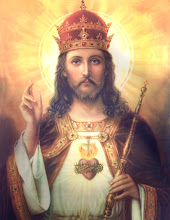




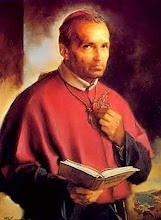
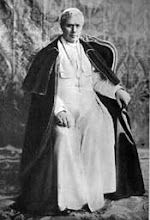
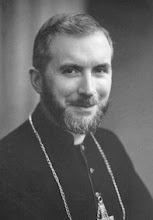

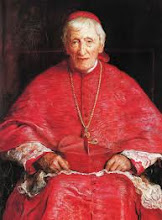


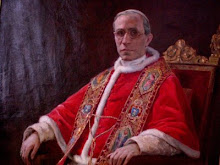
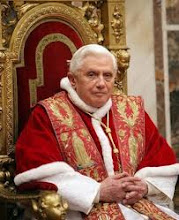


0 comentários:
Enviar um comentário